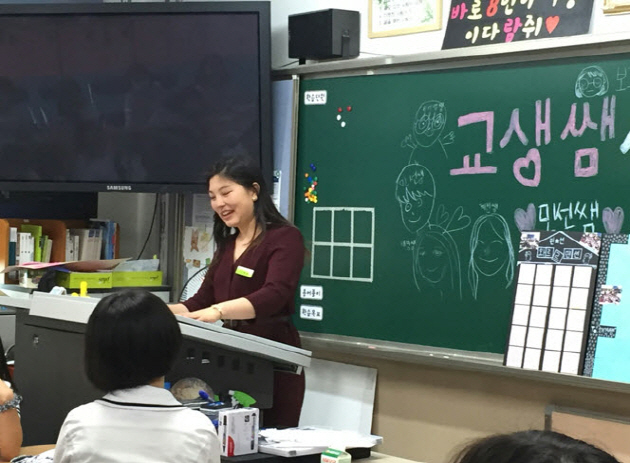
Me on the teacher podium, feeling awkward
When children are asked about their future dreams, one of the most common responses is a teacher. My answer wasn’t any different. I would sit on the chair in my bedroom with my legs crossed (an awkward posture for an eight-year-old), take the register which I had made with the names of my classmates (myself included), and give smiley face-stickers out to imaginary students who had volunteered to answer questions in class (again, myself included). While, 14 years removed from those childhood imaginings, I am pursuing a different career path, I have not abandoned my affection for teaching. My fascination with teaching was reawakened after the valuable experience I had the privilege of receiving in May of this year: the teaching practicum.
The Teaching License Program
In my second year at SNU, I came across an announcement about the teaching license program, in which students from majors other than those of the College of Education take education courses and receive a license in secondary education upon completion of the program. Since the School of Education is one of the few colleges of SNU that does not allow double majoring, this program is the only avenue for non-School of Education students to receive similar opportunities as those of the School of Education. Acceptance into this program is extremely competitive, being limited to students in the upper 10% of their grade. The application period opens once per year and is offered to sophomores only. Completing this program is in addition to completing the graduation requirements of one’s major (which, for some, includes taking a double major, a minor, or a more intensive course load within one’s major). Also, only students in majors that have corresponding departments within the School of Education are legible to apply. As a student from the Department of English Language and Literature, I was fortunate to be able to apply for the program, take courses from the Department Of English Language Education, and eventually receive a secondary teaching license as an English teacher.
The Teaching Practicum
Students of this program are required to undertake a five-week-long teaching practicum – a sine qua non to graduate from the College of Education. In this program, students receive hands-on experience teaching in a middle or high school. Each teaching practicum student teaches in one of four SNU-affiliated schools: Seoul National University (SNU) Elementary School, SNU Girls’ Middle School, SNU Middle School, and SNU High School. As the teaching license that is received is only limited to teaching in middle and high schools, the teaching practicum students only attend the elementary school for a week as observers. Approximately 120 practicum students per year are assigned to each school, introduced to their supervisors and tutor bases, given classes to teach, and assigned countless other responsibilities they will hold throughout the month.
My Practicum Experience
I felt lucky to be assigned to the school of my choice – SNU Girls’ Middle School. Out of the 120 students assigned to this school, I was one of 12 from the Department of English Language Education. A third-grade class was to be my beloved tutor base, and I was to teach an advanced-level first-grade as well as a low-intermediate-level third-grade English class. I taught eight English lessons over the course of four weeks.
While teaching eight lessons in four weeks may not sound like much, preparing for each lesson was far more grueling than I had expected. Each lesson required three meetings with my supervisor and group – one before the lesson, one after, and a follow-up meeting. For each meeting, I wrote a lesson plan that was edited, revised, and re-written, only to be scrutinized once again in the next meeting. But of all the laborious tasks required in preparing a lesson, none were more torturous than the PowerPoint presentations and worksheets. I became an expert in the field of K-pop boybands (Bangtan Boys is currently the hottest among middle school students). I tracked down their schedules in order to teach my students the simple future ‘be going to’ tense in a more enjoyable way (“BTS is going to have a fan sign meeting”). I used their photos posing with various facial expressions in order to teach vocabulary on feelings and emotions.

My PowerPoint presentations
As I prepared these presentations on my laptop at a café, those sitting nearby me probably assumed that I was a fan club president. In addition to this initial research, these presentations and worksheets would, once again, be subjected to countless rounds of editing and revision after each meeting.
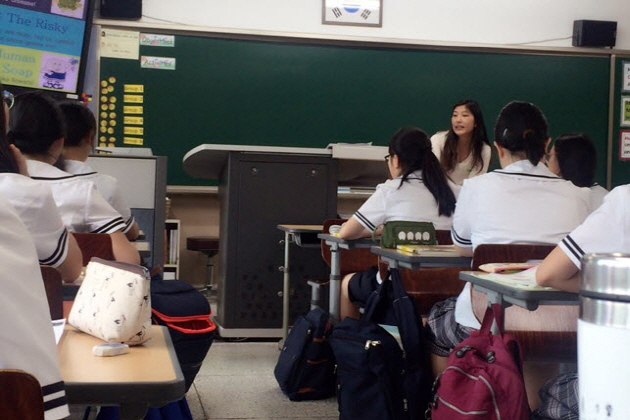
Teaching my first-grade class
In addition to teaching English, I was also to lead four morning and afternoon registration periods for my tutor base. The teacher wanted me to share personal stories and experiences that might help teenagers who are under a lot of pressure to choose their career paths and do well in school, on top of simply being at a confusing age to find and form their own identities. I shared my future dreams, and emphasized the fact that I am still, even at my advanced age of 22, in the process of finding and forming them. I shared with the students my struggles to build self-confidence, telling them that while I have made much progress, it is still an ongoing battle that I go through every single day. Most importantly, I shared with these girls the significance of being an empowered woman in this society despite the negative perceptions and obstacles that we face. I constantly reminded them that, as women we are going to face restrictions, but that this is not something that we should simply accept.
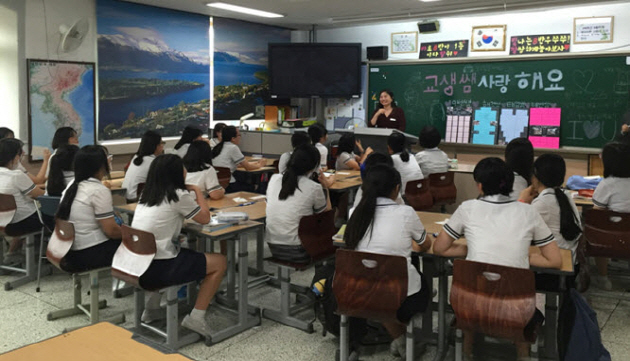
Speaking to my tutor base
I also participated in the school’s annual Sports Day, cheering on my tutor base students - though I did more consoling than cheering as they came in last in nearly every game in which they participated. But this was also a great opportunity to teach them an important lesson that my father had taught me: sometimes in life, it’s not the result that is most important, it’s the process. These same students that were placed last in the Sports Day brought me to tears with their beautiful voices in the school’s annual choral competition. As I listened to them sing the theme song ‘Colors of the Wind’ in Pocahontas, I was inspired by the hope for acceptance and unity in a society where these qualities are constantly being threatened. The children sang: And we are all connected to each other / In a circle, in a hoop that never ends.
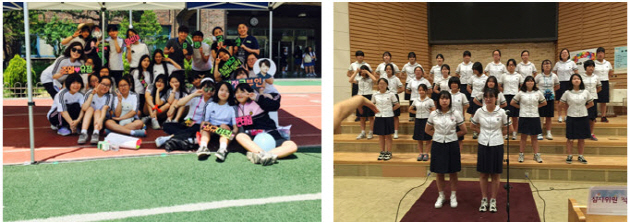
My tutor base at the Sports Day & Choral Competition
As an introvert, it was exhausting enough being around lively and energetic (at least, on their non-moody days) teenagers for nine hours a day, five days a week. On top of that, I barely managed two hours of sleep everyday - taking hour-long commutes, agonizing way too long in front of my mirror about the appropriateness of my skirt length, and stalking K-pop boybands on the internet while downing refill after refill of double-shot Americanos.
After being on the other side, I was finally able to understand the adage that being a student is one of the easiest jobs in the world. I had never longed so much to be taking weekly quizzes on Virginia Woolf and George Orwell at school. I have never felt so much admiration and respect for teachers all around the world for doing the things that they do, because I cannot imagine having to go through the rigors that I endured on my practicum for school year after school year. These days I am determined to actively participate more in class because I know how helpless it feels standing in front of a mute and unresponsive classroom. For the first time I am able to view my professors not only as experts with nothing more to learn, but as students like myself, learning and developing themselves more and more each day for and with the students. I have never felt so much care and adoration for teenagers, even the ones that outright slept - and so peacefully! - in my classes without the slightest tinge of guilt. But I have also never received so much love and admiration from teenagers, even from the sleepers; with all the shuteye that they got in my class, I didn’t even think that they would recognize me as their English teacher for the past month!
Some of the hardest goodbyes I have ever said were the ones I said to those children on the last day of my practicum. But I have never had so much hope for the future of our society. Even with the disasters and injustices that occur all too frequently in the world today, to the point where it’s hard just to face the world every day, I feel blessed beyond words to have a memory to look back on, reminding me that the future of humanity is, truly, in good hands.
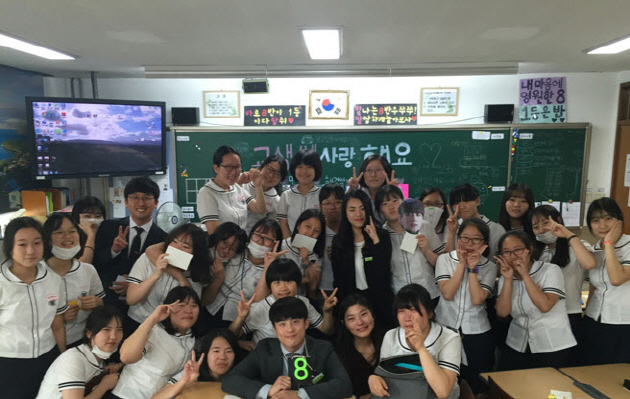
The Last Day
Written by Hye Bin Lee, SNU English Editor, hahahybes@snu.ac.kr
Reviewed by Professor Travis Smith, Department of Asian Languages and Civilizations, tlsmith@snu.ac.kr

